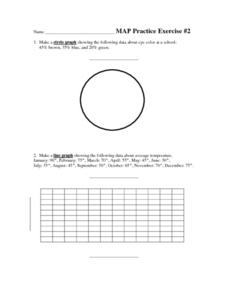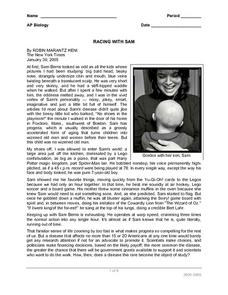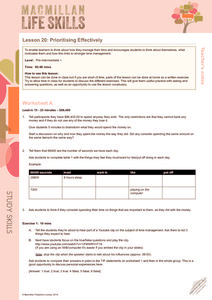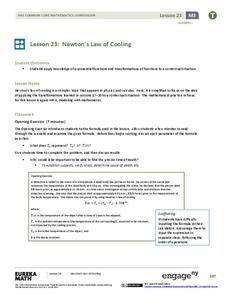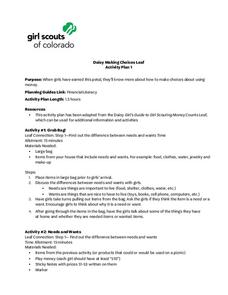Curated OER
Find The Hidden Message: Media Literacy in Primary Grades
Learners practice listening to and reading various types of media and text. In groups, learners use video, newspapers, magazines, and more to compare and contrast different types of information. They identify the differences between fact...
Curated OER
Volcanoes!: Forecasting the Path of Mudflows
Students construct a mockup of a volcano by crumbling up newspapers and piling them into the shape of a volcano. They place a tarp over the newspapers making sure the tarp is large enough to simulate a flat area at the volcano's base....
Curated OER
MAP Practice
In this geometry worksheet, students create circle, line and bar graphs using different comparisons of events. There are 24 questions with an answer key.
Teach Engineering
The Energy Problem
Think you can solve the energy problem? You'll first need to know about current energy use. Analyzing a set of circle graphs lets scholars see where energy consumption is the greatest, both by sector and by household use. They develop a...
Curated OER
All About Our Town
Pupils explore brochure writing. They work in groups to brainstorm and categorize important places in their community. In addition, they gather information from the Internet, take pictures using a digital camera, and create a community...
Curated OER
Museum Gallery
Children of all ages examine original art in an art gallery. They view art at an art gallery, then view reproductions, and compare and contrast the two works of art.
Curated OER
Science Fair Frenzy
Pupils examine the steps for developing science fair projects. They visit stations where they examine posters, books, and paper that describe how to research and design a science fair project. Additionally, they take notes on how to...
Curated OER
Piles of Paper
Track how much paper their class uses in a week. They will pile their used paper into one place, each day the pile is measured. They make predictions about how much paper they would collect in a month, then recycle the paper.
Curated OER
Making Objects Human
Explore poetry, personification, and multiple languages with a poetry reading and writing lesson. After the teacher reads the poem to the class, a discussion about personification follows. The class then writes a collaborative poem...
Curated OER
What is Air?
Students investigate air by participating in a class experiment. In this matter measurement lesson, students identify air as a gas which consists of mass. Students utilize a windsock or balloon to measure oxygen and explore it's true...
Curated OER
Racing with Sam
This assignment begins with an 8-page article about Sam Berns, a young man who suffers the rare genetic disease called progeria. Progeria is caused by a gene mutation and manifests itself as rapid premature aging. When your biology class...
Curated OER
Tracking the Salt Front
Using the Hudson River as the focus, learners discuss the difference between salt water and fresh water environments, analyze maps and graphs, and complete addition and subtraction problems. This lesson comes with a wealth of...
Curated OER
Reading Practice: Boris the Brainiest Baby
Boris is the smartest baby around! Beginning readers can use this short story excerpt to practice reading comprehension and fiction elements. They read the story and then discuss what they think he will do next. Scholars create an...
Curated OER
It's Time to Practice!
Telling time is easy, but if you're learning how to tell time in another language, it can be a tough adjustment! Give your middle and high school beginners this two-page worksheet to review time related vocabulary.
California Polytechnic State University
Australian Geography Unit
At the heart of this resource is a beautifully detailed PowerPoint presentation (provided in PDF form) on the overall physical geography of Australia, basic facts about the country, Aboriginal history, and Australia culture and lifestyle.
Macmillan Education
Prioritising Effectively
How do you determine the things you must do during your day from those that you want to do, or are willing to put off? Time management and prioritizing effectively are the focus of this life skills lesson, which includes worksheets,...
Massachusetts Institute of Technology
Lego Atoms and Molecules: Chemical Reactions
Show young chemists what a chemical reaction looks like with two parts of a hands-on experiment. First, learners conduct a wet lab where they observe the reactants (baking soda and calcium chloride, with phenolsulfonphthalein) before,...
Laboratory for Atmospheric and Space Physics
Charting the Progress of New Horizons
In 2006, New Horizons began its mission to fly to Pluto. As it continues its journey, scholars track its progress with the help of an informative website, all the while reinforcing measurement concepts with the construction of a scaled...
National Park Service
Hibernation-Migration-Fascination
What's the difference between hibernation and a good nap? Find out with an engaging life science activity that compares the hibernation habits of grizzly bears and marmots. After learners read an informational passage about each mammal,...
EngageNY
Newton’s Law of Cooling
As part of an investigation of transformations of exponential functions, class members use Newton's Law of Cooling as an exponential model to determine temperature based on varying aspects. The resource makes comparisons between models...
PHET
CME Plotting
Young scientists build on their previous knowledge and apply it to coronal mass ejections. By plotting the path of two different coronal mass ejections, they develop an understanding of why most don't collide with Earth.
University of Colorado
Astro-Chronology
Class members play a version of the game Chronology to determine when certain scientific events occurred in history. Teams play until someone has 5-10 events in the correct order.
Girl Scouts
Daisy Making Choices Leaf
Shed light on the concept of financial literacy with a series of four activities that examines needs vs. wants, gives scholars the opportunity to buy products using paper money, and set goals to save money.
Bethel School District
Health Triangle Self Assessment
Measure health as a triangle, with each side representing different aspects of health: physical, emotional/mental, and social. High schoolers complete a self-assessment of their health in all three areas before scoring their progress and...
Other popular searches
- Converting Minutes to Hours
- Seconds, Minutes, Hours
- Hours Minutes Seconds
- Convert Minutes to Hours
- Seconds Minutes Hours Days
- Minutes to Hours
- Adding Hours and Minutes
- Math Hours Minutes
- Addition Hours and Minutes
- Hours Minutes Seconds Earth
- Estimating Minutes and Hours
- Converting Hours and Minutes




